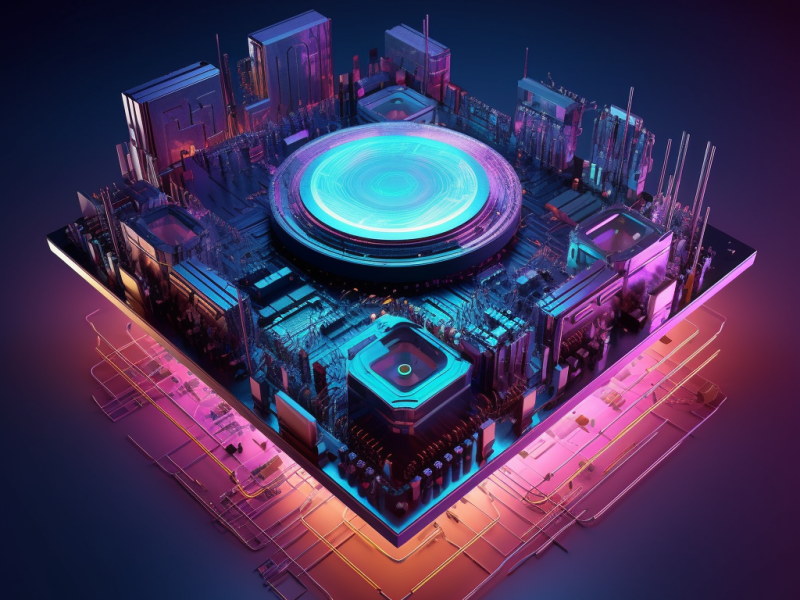Introduction to Quantum Computing.
Quantum computing is a rapidly emerging field that leverages the principles of quantum mechanics to process information. Unlike classical computers, which use bits to represent data as 0s and 1s, quantum computers use quantum bits or qubits. Qubits can exist in multiple states simultaneously, allowing quantum computers to perform multiple calculations at once, leading to significantly faster processing times for specific tasks.
Basics of IoT
The Internet of Things (IoT) refers to the network of interconnected physical devices embedded with sensors, software, and connectivity, enabling them to collect and exchange data. IoT devices can include everyday items like smartphones, home appliances, wearables, and industrial machinery. The primary goal of IoT is to improve efficiency, enable new services, and enhance the quality of life by integrating the physical world with the digital realm.
Quantum Computing Applications in IoT.
Quantum computing has the potential to revolutionize various aspects of the IoT ecosystem. Some promising applications include:
- Enhanced Security: Quantum computing can help develop advanced cryptographic techniques to protect sensitive data from cyber threats, ensuring the secure transmission of information between IoT devices.
- Optimized Network Management: Quantum computing can efficiently solve complex optimization problems, enabling better management of resources and the allocation of tasks in IoT networks.
- Machine Learning: Quantum machine learning algorithms can process large volumes of data generated by IoT devices more efficiently, leading to improved decision-making and predictive capabilities.
- Data Compression: Quantum algorithms can be used to compress IoT-generated data, reducing storage and communication overheads.
These applications, among others, demonstrate the potential synergy between quantum computing and IoT, paving the way for a new era of innovation.
Challenges and Opportunities.
While quantum computing and IoT hold significant potential, there are challenges to overcome and opportunities to seize:
Challenges:
- Technological Limitations: Quantum computers are still in their early stages, and large-scale, practical devices are yet to be developed. Moreover, the integration of quantum computing with IoT systems requires advancements in hardware, software, and communication technologies.
- Security Concerns: Despite the promise of quantum-resistant cryptography, the advent of quantum computing also poses risks to existing cryptographic methods, necessitating the development of new security protocols for IoT.
- Scalability: The massive scale of IoT networks demands efficient and scalable quantum computing solutions, which is an ongoing challenge.
Opportunities:
- Research and Development: The growing interest in quantum computing and IoT creates opportunities for academia and industry to collaborate on innovative solutions, driving technological advancements.
- Market Growth: As quantum computing matures and integrates with IoT, new markets and business opportunities are expected to emerge across various sectors, such as healthcare, transportation, and energy.
- Enhanced Services: The combination of quantum computing and IoT can lead to the development of advanced services that are faster, more efficient, and secure, ultimately improving the quality of life and business operations.
Future Outlook
The future of quantum computing and IoT is promising, with both fields undergoing rapid advancements. As quantum computers become more powerful and accessible, their impact on IoT is expected to become increasingly profound. Some key trends to watch for include:
- Quantum computing as a service (QCaaS): As quantum computing technology matures, it is likely to be offered as a service, allowing businesses and researchers to access and utilize quantum resources remotely, similar to cloud computing.
- Development of quantum-resistant cryptography: With the potential threat to existing cryptographic methods, there will be a growing demand for quantum-resistant cryptographic techniques to ensure the security of IoT ecosystems.
- Proliferation of IoT devices: As the number of IoT devices continues to grow exponentially, the need for efficient data processing, analysis, and optimization will drive the adoption of quantum computing solutions.
- Quantum-enhanced machine learning: As machine learning becomes more prevalent in IoT applications, quantum-enhanced algorithms will play a crucial role in improving the accuracy and efficiency of data-driven decision-making.
The intersection of quantum computing and the Internet of Things (IoT) holds tremendous potential for transforming the landscape of information processing and connectivity. Quantum computing’s ability to leverage the principles of quantum mechanics, particularly through qubits, introduces a paradigm shift by enabling simultaneous calculations, leading to unprecedented processing speeds.
The applications of quantum computing in IoT span enhanced security, optimized network management, efficient machine learning, and data compression, showcasing the versatility and adaptability of this emerging technology. These innovations promise to redefine how data is collected, transmitted, and analyzed in the IoT ecosystem, ultimately enhancing efficiency and paving the way for new services and capabilities.
However, as with any transformative technology, there are challenges to address. Technological limitations, security concerns, and the scalability of quantum computing solutions for IoT networks present hurdles that require ongoing research and development. Nevertheless, these challenges also present opportunities for collaboration, innovation, and the growth of new markets.
Looking ahead, the future of quantum computing and IoT appears promising. Trends such as quantum computing as a service (QCaaS), the development of quantum-resistant cryptography, the proliferation of IoT devices, and the integration of quantum-enhanced machine learning are poised to shape the trajectory of these fields. As both quantum computing and IoT continue to advance, their convergence is expected to unlock new possibilities, revolutionizing industries and improving the quality of services across various sectors. Connect with your reliable experts for quantum IoT projects


